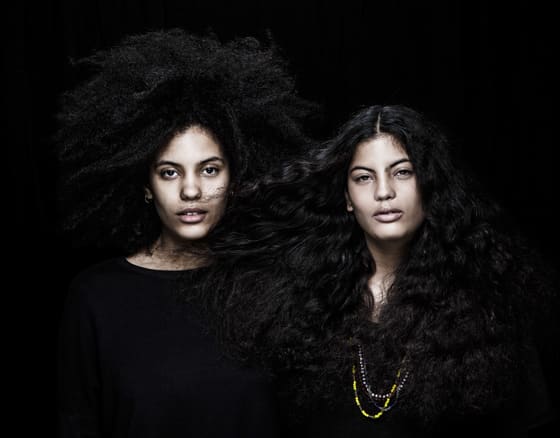While most young people spend their teenage years repudiating their parents, French-Cuban fraternal twins Lisa-Kaindé and Naomi Diaz, known as Ibeyi, spent theirs finding common ground. After their father — revered Cuban percussionist Miguel "Angá" Díaz — died when they were just 11, the girls sought a way to remember and honour him.
In the years following his passing, Lisa-Kaindé started composing the songs that would become Ibeyi's self-titled debut, out now on XL Recordings. Naomi, who joined later, took up the instrument Angá was most fascinated by when he departed: a box-shaped percussion instrument called the cajón.
"I think it was unconscious," explains Naomi over Skype from Paris as Lisa-Kaindé nods beside her, "but I think yes, it was a way to connect with him. I'm pretty sure if he still would be here, I wouldn't play cajón."
Though the pair had musical loves of their own — Naomi likes Kendrick Lamar, hip-hop and electronic sounds, Lisa-Kaindé prefers classic soul and jazz, especially Nina Simone — they couldn't help but absorb the Latin soul and jazz their father played, as well as the traditional music of their parents' culture, the Yoruba, an ethnic group based in Nigeria and Benin that migrated to Cuba during the 1700s.
Lisa-Kaindé says they hear the question all the time: "'How come you like the music that your parents like? Usually when you're a teenager you don't like the music that your parents like.' But our parents were so cool! It was impossible to not like the music that they liked!"
By their late teen years, Lisa-Kaindé and Naomi had started performing together as Ibeyi (the Yoruba word for twins), mixing their parents' music with their own diverse influences to create a unique hybrid sound that mixed soul, hip-hop rhythms, traditional Yoruba chants and electronic flourishes. They were discovered by XL's Richard Russell, who guided them through the recording process. In the studio, new songs poured out of them.
"I thought I was not able to compose a song for our elder sister [also deceased, in 2013] and our father," says Lisa-Kaindé, "but actually, Richard gave me the confidence to write them."
Those poignant songs, "Yanira" and "Think of You," respectively, sit alongside gems like the seductive, piano-based "Faithful" and the multi-movement "Ghosts," which switches from cajón-based groove to piano-and-voice balladry to triumphant Yoruba chanting, all within three-and-a-half minutes. It's that diversity of sound that drives Ibeyi and Ibeyi alike.
"I think the good thing about our relationship is we are really different, we have different tastes in music. That's why our music is like that — it's a mix of two people! It's a mix of Yoruba culture and Occidental culture, but it's a mix of us, too. I definitely think confronting our ideas was a good thing for this album."
"And it will be the same for the second," adds Naomi. "She wants to do more weird stuff, and I want to do more hip-hop stuff, so we need to—"
As if on cue, in unison: "Compromise."
In the years following his passing, Lisa-Kaindé started composing the songs that would become Ibeyi's self-titled debut, out now on XL Recordings. Naomi, who joined later, took up the instrument Angá was most fascinated by when he departed: a box-shaped percussion instrument called the cajón.
"I think it was unconscious," explains Naomi over Skype from Paris as Lisa-Kaindé nods beside her, "but I think yes, it was a way to connect with him. I'm pretty sure if he still would be here, I wouldn't play cajón."
Though the pair had musical loves of their own — Naomi likes Kendrick Lamar, hip-hop and electronic sounds, Lisa-Kaindé prefers classic soul and jazz, especially Nina Simone — they couldn't help but absorb the Latin soul and jazz their father played, as well as the traditional music of their parents' culture, the Yoruba, an ethnic group based in Nigeria and Benin that migrated to Cuba during the 1700s.
Lisa-Kaindé says they hear the question all the time: "'How come you like the music that your parents like? Usually when you're a teenager you don't like the music that your parents like.' But our parents were so cool! It was impossible to not like the music that they liked!"
By their late teen years, Lisa-Kaindé and Naomi had started performing together as Ibeyi (the Yoruba word for twins), mixing their parents' music with their own diverse influences to create a unique hybrid sound that mixed soul, hip-hop rhythms, traditional Yoruba chants and electronic flourishes. They were discovered by XL's Richard Russell, who guided them through the recording process. In the studio, new songs poured out of them.
"I thought I was not able to compose a song for our elder sister [also deceased, in 2013] and our father," says Lisa-Kaindé, "but actually, Richard gave me the confidence to write them."
Those poignant songs, "Yanira" and "Think of You," respectively, sit alongside gems like the seductive, piano-based "Faithful" and the multi-movement "Ghosts," which switches from cajón-based groove to piano-and-voice balladry to triumphant Yoruba chanting, all within three-and-a-half minutes. It's that diversity of sound that drives Ibeyi and Ibeyi alike.
"I think the good thing about our relationship is we are really different, we have different tastes in music. That's why our music is like that — it's a mix of two people! It's a mix of Yoruba culture and Occidental culture, but it's a mix of us, too. I definitely think confronting our ideas was a good thing for this album."
"And it will be the same for the second," adds Naomi. "She wants to do more weird stuff, and I want to do more hip-hop stuff, so we need to—"
As if on cue, in unison: "Compromise."




